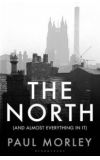
14 Jun 2013 03:07:08
Morley's book, however, fails to record that this great musical tradition suffered a steep decline. Three decades later, I myself stood on the stage of the Free Trade Hall clad in red blazer and grey shorts, singing shamelessly chauvinistic songs as a member of the school choir on Speech Day. The chauvinism, I now recognise, was an attempt by my Irish immigrant community to ingratiate itself with mainstream English culture. Within a few square miles of my home, a band of Salford men and women en route to stardom revealed their Irish origins in their surnames: Albert Finney, Shelagh Delaney, Steven Morrissey, John Cooper Clarke. Burgess can be an Irish name, and so can Morley.
Another Irish Salfordian, LS Lowry, overshadowed them all. My mother recalled how he was given a wide berth by the local populace, though whether this was because he was an artist or a rent collector was never clear. He in turn shunned the British establishment, turning down a CBE, OBE and knighthood. The Salford of my youth was also secretly breeding Ben Kingsley, Mike Leigh and Peter Maxwell Davis. It had previously given birth to the great folksinger and cultural activist Ewan MacColl, and today is a home to an exiled bunch of BBC producers. Who said cotton mills were inimical to culture?
There's no need to get too misty-eyed about the region, however, a warning Morley would have been wise to heed. This affectionate piece of anthropology is marred by a tiresomely rhapsodic tone. "I found it, my north," he gushes, "smoking and babbling, battling and loving, scattered and glittering, lush and brisk … rickety and plush, conspiring and crackling." Reticence is not this author's strong point. There is a compulsive use of the couplet: "brilliance and persistence, acceptance and slyness, dirt and glamour". There is also a reference to northerners who speak "with a certain sort of tough, scuffed and striven fluency", preferring the "slap, twist and thud" of their own speech to "the slur, sting and snap of near neighbours". There is certainly a glut of scuffing, slapping and thudding in these extravagantly overwritten pages, in which Ian Brady and Myra Hindley become "charred, trapped scraps of frustrated northern will". It makes them sound even worse than serial killers. Liverpool, predictably, provokes Morley to a bout of severe verbal flatulence: "Liverpool, passion. Liverpool, moving, Liverpool, moving cotton, sugar, slaves, invoices, music, ideas here, there and everywhere …"
Writers who wish to avoid hoots of southern derision would do well to avoid sentences like: "There was only one tree in our garden, which never produced any leaves." One can almost hear the cries of "Luxury!" from satirists of the prolier-than-thou syndrome. If you begin a paragraph: "I don't remember my dad making anything other than a pot of tea, eccentrically spreading marge on his Weetabix and dousing his Kellogg's Cornflakes in milk and sugar", you have only yourself to blame if a reader scrawls "before feeding the lot to his whippet" in the margin.
This grab-bag of a book mixes poetry and sociology, history and autobiography. Yet if some of it suffers from a rather slipshod lyricism, the auto-biographical sections are too flatly naturalistic. It is interesting to know that the Beatles were turned away from the restaurant of Manchester's Midland hotel for being inappropriately dressed, and that Les Dawson was able to pull such grotesque faces because he broke his jaw in a boxing match, but not that Morley used to catch the bus at five past eight so as to be at school by a quarter to nine. He grew up in a part of Stockport called Reddish, and the book's obsession with the place is so relentless that one begins to wonder whether it is meant to be self-parody. We are provided with a nerdish list of bus stops, a grim, socialist-realist-type photo of the local 92 bus and a small, Sebald-like map of the terrain. Like many a life-writer, Morley is too ready to assume that things are important simply because they happened to him. Freud once noted the gap between the vividness of our dreams for us and the tedium we inflict in telling them to others, and much the same can be true of recounting your life history.
Even so, the book partly redeems itself by its passion and chutzpah. It is a great baggy monster of a love letter to its author's provincial origins, ranging all the way from ice age Cheshire to the invention of the eccles cake. There are times when it seems to mistake northern England for the streets around Stockport Viaduct (the Geordies don't get much of a look in), but there is some impressively erudite stuff on the hat-making industry, the Lancashire genius for comedy and a good deal more.
We learn that a Liverpool man invented the crossword, and that Beatles manager Brian Epstein grew up on the same street of the city as Gladstone. Sheffield produced the jelly baby as well as knives and forks, and Stockport, not Tokyo, came up with the first karaoke machine. It's just that it would have been nice to make these discoveries without all the romantic froth.

